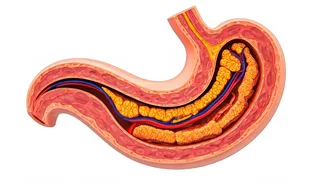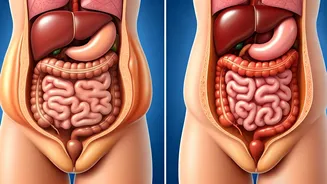Myth 1: Calories Always Matter
The first myth tackled is the focus solely on calories. The idea that a calorie is a calorie, regardless of the source, is inaccurate. While calorie counting
is important for weight management, the origin of those calories significantly affects our health. Consuming 200 calories of processed food versus 200 calories from a salad yields drastically different effects. The salad provides essential nutrients like vitamins and fiber, which improve overall well-being. Focusing solely on caloric intake without considering nutritional value can lead to deficiencies and health problems. This means to go for nutrient-dense foods instead of focusing just on low-calorie options.
Myth 2: Carbs are the Enemy
The second myth targets the demonization of carbohydrates. Carbs have unfairly gained a bad reputation, with many believing they should be avoided altogether. The truth is, carbohydrates are essential for energy, particularly for physical activity. Whole grains, fruits, and vegetables provide necessary fiber, vitamins, and minerals. Simple carbs, like those found in sugary drinks and processed foods, should be limited. Carbohydrates are not inherently bad; the key is choosing the correct ones. Choosing complex carbs over simple sugars can help maintain energy levels while providing essential nutrients, which supports a healthy diet.
Myth 3: All Fats are Bad
Moving on to myth number three, the misconception that all fats are harmful. Dietary fat is crucial for numerous bodily functions, including hormone production and the absorption of fat-soluble vitamins. There are several types of fats; some, such as unsaturated fats from avocados and olive oil, are beneficial for heart health. Saturated and trans fats, which are found in processed foods and some animal products, should be consumed in moderation, and can increase the risk of heart disease. The emphasis should be on selecting healthy fats and limiting unhealthy ones, not eliminating them entirely. Fats are vital for providing long-lasting energy and supporting brain health.
Myth 4: Supplements Equal Health
Next, the idea that supplements are always beneficial. While supplements can address specific nutritional gaps, they should not replace a balanced diet. Many believe popping pills will fix a bad diet, but the body absorbs nutrients best from food. Excessive reliance on supplements may lead to overdoses of vitamins and minerals. The best approach is to focus on a varied diet filled with whole foods and use supplements if necessary, and always after consulting a healthcare professional. A comprehensive diet naturally provides a mix of nutrients that supplements may not always replicate.
Myth 5: Detox Cleanses Are Effective
The fifth myth questions the effectiveness of detox cleanses. The body naturally detoxifies through organs such as the liver and kidneys. These organs are designed to filter out harmful substances without needing specialized cleanses. The claims of rapid weight loss or toxin removal from detox programs are often unproven and may be misleading. Instead of cleansing, it is more important to consume healthy foods and drink plenty of water to support natural detoxification processes. Focusing on a balanced diet and regular exercise is a more effective and sustainable approach to health.
Myth 6: Gluten Is Always Bad
This myth addresses the generalized fear of gluten. Gluten is a protein found in wheat, barley, and rye. For those with celiac disease or gluten sensitivity, avoiding gluten is vital. However, for most people, gluten is not inherently harmful. Trends like gluten-free diets are often embraced without considering whether they are actually needed. Unless there is a diagnosed medical condition, there is no need to eliminate gluten. A balanced diet that includes whole grains can offer essential nutrients. Cutting out gluten unnecessarily might lead to missing important dietary fibers and nutrients.
Myth 7: Organic Foods are Superior
The seventh myth focuses on organic foods. While organic foods are grown without synthetic pesticides and fertilizers, the notion that they are always superior is debatable. Organic foods can offer certain benefits like reduced exposure to pesticides. However, there is no definitive evidence that organic foods are more nutritious than conventionally grown options. The nutritional content depends on several factors, including the soil's quality and the produce's freshness. Buying organic can be a matter of personal preference but is not always a requirement for a healthy diet. The key is to consume a variety of fruits and vegetables, whether organic or not.
Myth 8: Eating Late Is Weight Gain
The eighth myth tackles the assumption that eating late causes weight gain. The timing of food consumption is less critical than the overall calorie intake and the quality of the food. Consuming an excessive number of calories throughout the day, regardless of the time, leads to weight gain. The body processes food efficiently whether it is consumed in the morning, afternoon, or evening. Factors such as the overall activity level, metabolism, and the quality of the food consumed affect weight management. It is more important to focus on making healthy food choices at all times.
Myth 9: Exercise Replaces Diet
The last myth discusses the balance between diet and exercise. Exercise is vital for health and weight management, but it cannot completely counteract an unhealthy diet. Physical activity helps burn calories, build muscle, and improve overall health, yet it is only one part of the equation. Diet plays a more crucial role. It is important to focus on eating nutritious foods that support physical activity. The combination of a balanced diet and regular exercise is the most effective way to attain and maintain health. One shouldn’t be prioritized over the other; both are equally necessary for overall well-being.


















